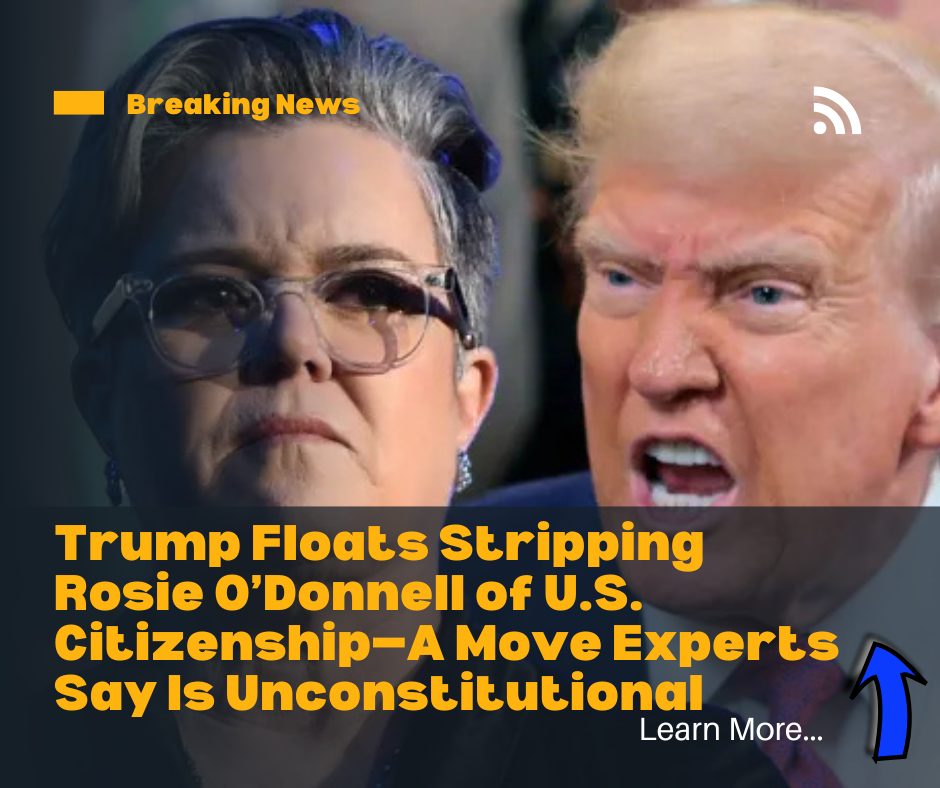In yet another eyebrow-raising social media outburst, former President Donald Trump announced that he is “seriously considering” revoking the U.S. citizenship of comedian and longtime rival Rosie O’Donnell. The move, announced via a post on his Truth Social platform, has sparked widespread outrage and legal backlash, with constitutional experts calling the threat impossible, illegal, and deeply authoritarian.
🇺🇸 What Trump Said
The former president called O’Donnell a “Threat to Humanity” and accused her of abandoning the United States by relocating to Ireland earlier this year with her child. Trump implied she was no longer deserving of American citizenship and suggested she remain overseas permanently.
But the jab didn’t stop there — he hinted that her citizenship status may be up for review:
“I am giving serious consideration to taking away her U.S. citizenship,” Trump posted. “She hates this country. Let her stay in Ireland with her leftist poison.”
📍 O’Donnell Hits Back
Rosie, never one to back down, fired off a direct response:
“You will NEVER silence me,” she wrote on Instagram. “You are a criminal, a liar, and a disgrace. I’m not yours to control — I never was.”
She followed up with a video mocking Trump’s mental state and legal troubles, adding, “This man wants to strip me of citizenship because I speak out. That’s not democracy — that’s dictatorship.”
⚖️ Legal Experts Say: “Not Gonna Happen”
Law scholars wasted no time clarifying that Trump has zero power to revoke birthright citizenship, especially for someone born on U.S. soil — as O’Donnell was, in 1962 in New York.
According to Amanda Frost, a law professor at the University of Virginia:
“The president cannot legally revoke citizenship from native-born Americans. There is no constitutional mechanism for it, and even if Congress passed a law trying to allow it, it would be struck down immediately.”
The Fourteenth Amendment of the U.S. Constitution protects anyone born on American soil, regardless of politics, religion, or ideology.
🧠 The Bigger Picture
Trump’s suggestion is less about actual policy and more about silencing dissent. While O’Donnell has been one of his most outspoken celebrity critics for nearly two decades, threatening to strip someone of citizenship simply for their views pushes the boundaries of political rhetoric into dangerous territory.
This is not the first time Trump has threatened individuals with denaturalization or deportation. In past years, he questioned the legitimacy of birthright citizenship and once suggested using executive orders to revoke it — a legal impossibility that alarmed even conservative legal circles.
🌎 O’Donnell’s Move to Ireland
Rosie relocated to Ireland in January 2025 after Trump’s re-election, citing safety concerns and a desire for her non-binary autistic child to grow up in a more inclusive environment. She has remained politically active abroad and continues to voice her opposition to Trump’s policies — something that clearly still strikes a nerve.
🧭 Why This Matters
-
Trump’s statement, while legally meaningless, reflects a growing trend of weaponizing citizenship as a tool for political retaliation.
-
It tests the boundaries of free speech and raises serious concerns about how far a president might go to punish dissent.
-
The backlash may further polarize political discourse ahead of the 2026 midterm elections.
🔚 Final Word
Rosie O’Donnell’s citizenship isn’t going anywhere — but the idea that a former president believes he should have that power is a reminder of how fragile democratic norms can be when authoritarian instincts go unchecked.
